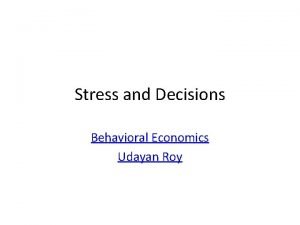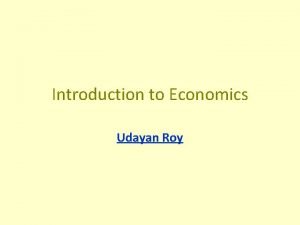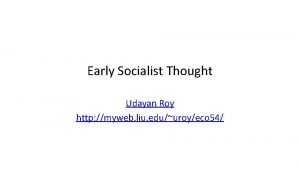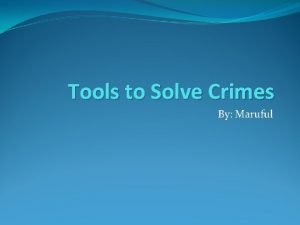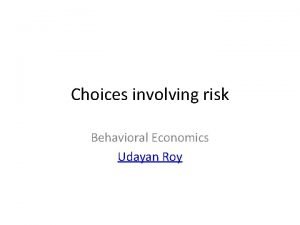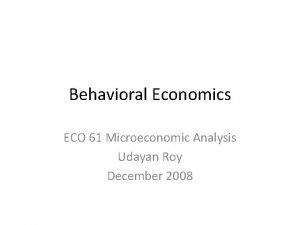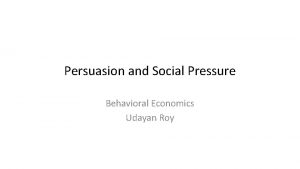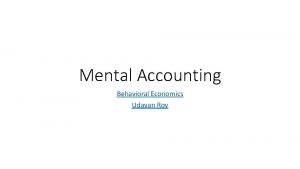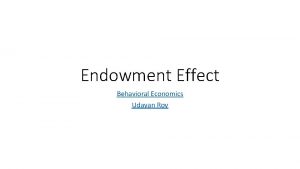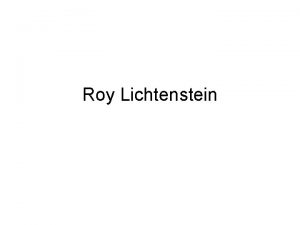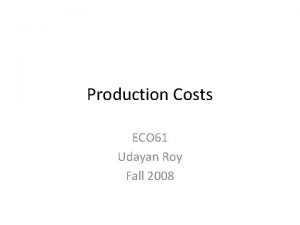Introduction to Economics Udayan Roy Introduction to Economics















- Slides: 15

Introduction to Economics Udayan Roy

Introduction to Economics • • What is economics? What is the use of economics? What are economists expected to do? How do economists do what they are expected to do? • Why does the economist’s method sometimes fail? • What is macroeconomics? What is microeconomics?

What is Economics? • Economics is the study of – our responses to scarcity, and – the consequences of those responses. • Scarcity is usually defined in economics as the fact that we can’t always get what we want.

What is the Use of Economics? • Scarcity compels us to come up with less wasteful ways of running our societies. – We all want progress and we all want to reduce hunger, poverty and inequality. – But our resources are finite. – Therefore, we can’t afford to run our societies in wasteful and inefficient ways. • That’s where good economic policies have a crucial role to play. • That’s where the economist can make a contribution.

Wasted Resources: Stuck in Traffic • We waste a lot of time stuck in traffic • Economists would want to find a way to reduce this waste of time • Building more roads – may not always be possible, – may not solve the problem, and – would be costly in any case • Charging car owners for the use of a road may be the way to go • Investing in or subsidizing public transport is another option It is the economist’s job to list the options available and to predict the likely costs and benefits of each option

Wasted Resources: Unemployment • What can we do to reduce this waste of resources? • Cut taxes to encourage people to go shopping? • Build more roads and bridges? • Make overtime work illegal? • Limit imports? It is the economist’s job to list the options available and to predict the likely costs and benefits of each option

Ethical Imperatives: Health Care How can we help the 50. 7 million people who have no health insurance? Build government-run hospitals like the VA system for veterans? Use taxpayers funds to help the It is the economist’s job to list uninsured buy private health insurance? the options available and to Allow the import of cheaper drugs? predict the likely costs and Cut the length of drug patents? benefits of each option Make it easier foreign doctors to work here?

Ethical Imperatives: Inequality • How can we ensure that incomes are more equally shared, if that’s what we want? • Raise taxes on the rich? • Invest in and subsidize higher education? • Change existing laws to strengthen labor unions? It is the economist’s job to list the options available and to predict the likely costs and benefits of each option

What Are Economists Expected to Do? • As we have just seen, when asked specific policyrelated questions, the economist has to think hard and : 1. Identify the list of the options available to society, and 2. Make predictions of the consequences—costs and benefits—that would follow from each of those options. • The democratic process must then decide which option to pursue.

How Do Economists Do What They Are Expected to Do? • Economists make simplifying assumptions • This helps them make logical predictions about the likely consequences of different policy options • Economists usually disagree with each other • They try to use data to sort out their disagreements • If all goes well, economists may come up with unambiguous and useful advice for policy makers.

Why Does the Economist’s Method Sometimes Fail? • We have just seen that different economists may give different answers (predictions) for the same question. • Those disagreements can’t always be sorted out. (Why? ) • This leaves the general public puzzled annoyed.

What Is Macroeconomics? What Is Microeconomics? • Macroeconomics deals with questions about variables that describe the economy of an entire nation. (More) • Microeconomics deals with questions related to individual economic agents, such as households and firms. (More)

Macroeconomics • Macroeconomics deals with issues related to data that give summary descriptions of the economy of an entire nation. • A macroeconomist would ponder questions such as, – what would happen to Uzbekistan’s unemployment rate if Japan suddenly stops trading with Uzbekistan and – what policy should the government of Uzbekistan then follow? • The focus would always be on Uzbekistan as a whole.

Microeconomics • Microeconomics deals with questions related to economic variables that describe a sub-national entity, typically individual economic agents, such as households and firms.

Macro and Micro Are Related • One cannot really do macroeconomics without simultaneously doing microeconomics. – One cannot analyze an economy without studying the behavior of the individual economic units that make up that economy. • However, in macroeconomics the microeconomic underpinnings are de-emphasized.
